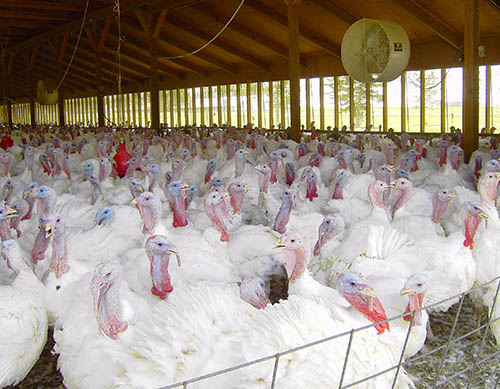
By Emery Styron
news@corridorbusiness.com
The future of the Corridor’s turkey industry is as fragile as an eggshell as area farmers tighten biosecurity measures and anxiously watch the current outbreak of avian influenza spread across the state.
Since mid-April, 20 million birds – a half-million of them turkeys – on 28 farms across Iowa have been affected by the virus, and have been or are slated to be destroyed.
“It’s nerve-wracking,” said farmer Russ Yoder, who runs 220,000 birds a year through his operation, Turkeys R Russ, near Wayland. “You hope and pray that the birds flying over your farm don’t have it. You change boots and clothes. You shower. You stay out of town. You spray your shoes before and after you walk into a gas station and spray down the floor mats in your truck.”
While farmers guard against contamination and hope for virus-killing hot weather, West Liberty Foods, which processes 5.2 million birds a year at its plant 18 miles southeast of Iowa City, is ready with contingency plans to ensure its supply in case its 70 local member-growers are forced to depopulate their flocks.
West Des Moines attorney Dan Waters, general counsel for West Liberty Foods (WLF), said the plant is prepared to acquire turkey meat from other geographic areas, if need be, to maintain production for its customers. Those include sandwich giant Subway and an assortment of private-label food firms, all of which have confidentiality agreements with WLF.
WLF employs 900 workers at its West Liberty plant and 2,200 overall, including plants in Mt. Pleasant, Bolingbrook, Ill., and Tremonton, Utah. Iowa farm operations supplying the West Liberty plant are concentrated in the Washington-Wayland area and near Ellsworth and Story City in central Iowa. Though no cases of avian flu have been reported in any counties where WLF has growers, the disease is getting perilously close. Ellsworth is in Hamilton County, just south of Wright County, where a commercial chicken operation with 2.8 million birds was reported as probably infected on May 4.
“The biggest impact is that our grower base has implemented extra security measures on the farm. Beyond that, we really haven’t been impacted,” Mr. Waters said.
Biosecurity measures include boot and tire washes, disposable boot covers and clean coveralls each time a worker enters a barn. Mr. Yoder discourages his workers from going to town and tries to keep one worker to a farm, “so we don’t cross-contaminate.”
Mr. Yoder noted that his family has raised turkeys since 1938, and has had to depopulate its flock before, “but we’ve never seen anything like this.”
Recouping losses
Gretta Irwin, executive director of the Iowa Turkey Federation, said the U.S. Department of Agriculture maintains an indemnity fund to help compensate farmers for euthanized birds, and pay for some of the costs of composting the birds and cleaning and disinfecting facilities, but “the real tough part for farmers is when they have to sit idle.”
“The farmers miss a check for the flock that went down, then another check for the time spent cleaning and disinfecting,” Ms. Irwin said.
It takes roughly four months to raise a flock of turkeys. Farmers with infected facilities can expect to miss two out of three potential production cycles a year, Ms. Irwin said. The huge numbers of chickens and turkeys already destroyed in northwest Iowa has also begun to affect corn prices, she noted.
The potential economic impact of avian flu in southeast Iowa would likely be severe. Agriculture is king in Wayland, which is located 20 miles south of Washington, just over the Henry County line. Agri-Way Partners operates a feed mill, one of the major businesses in town and serves about 20 turkey growers in the two-county area.
Robert Achen is one of those growers, as well as secretary of the West Liberty Foods Co-op’s board of directors and president of Agri-Way Partners.
“The way the thing [avian flu] is moving around and back south in the state is very concerning,” he said. Any shutdown of a turkey operation “puts a huge financial burden on the producer,” he said.
Effects on producers can quickly ripple through the economy to truck drivers, feed ingredient makers, equipment suppliers and processors, Mr. Yoder said. He noted that Jennie-O Turkey, a division of Hormel Foods Corp., laid off 233 employees at its turkey processing plant in Faribault, Minn., due to decreased turkey numbers.
With their livelihoods at stake, commercial growers are doing all they can to protect their flocks, but Mr. Yoder worries that backyard poultry operations may not be taking the threat seriously enough. It’s important for anyone who raises poultry, no matter how small the amount, to monitor the health of their flock, and report any flu-like symptoms to the local sheriff or the Iowa Turkey Federation, he said. To stop the spread of disease, dead birds must be disposed of properly.
“We don’t want someone to throw one in the back of a pickup and drive across Iowa shedding feathers,” Mr. Yoder said.




